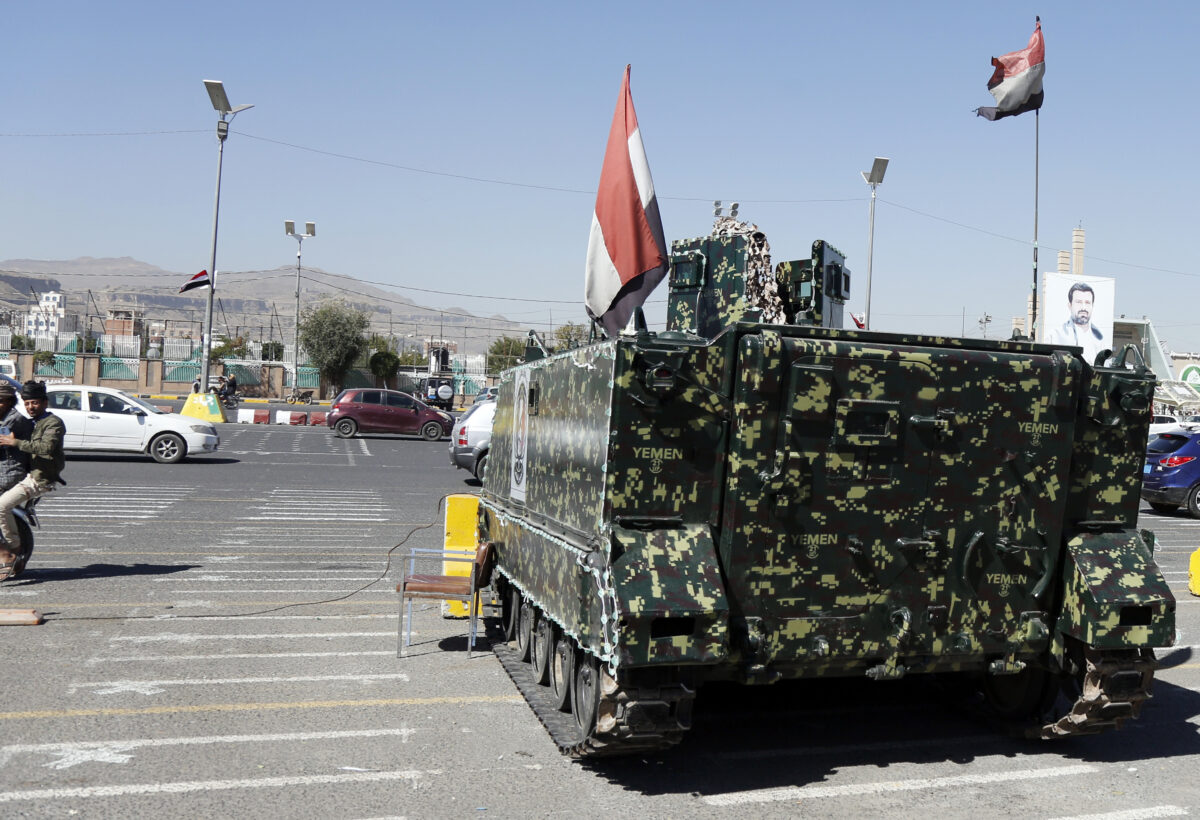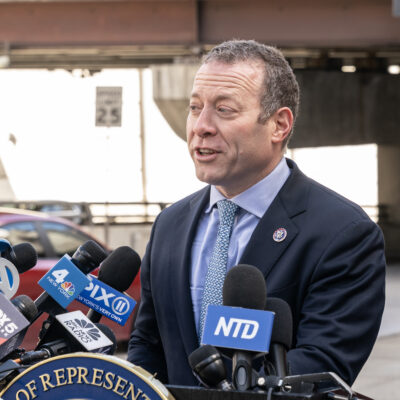U.S. should respond to Houthi attacks ‘twice as hard,’ Ricketts says, as lawmakers weigh in on potential strike
The Biden administration is reportedly wary of directly attacking the Iran-backed Yemeni group, and lawmakers offered a range of perspectives on the issue

Mohammed Hamoud/Getty Images
Yemenis drive next to an armored positioned for manning in Al-Sabeen square on December 05, 2023 in Sana'a, Yemen.
Senate lawmakers offered a range of views on how the administration should respond to the Houthis’ escalating attacks in the Red Sea, including missile fire and drone attacks on Israel and ships and hijacking commercial vessels.
Despite the escalation by the Iran-backed Yemeni militia group, the Biden administration is reportedly wary of carrying out strikes on the group’s assets in Yemen, believing that the Houthis have not been directly targeting U.S. warships and that direct strikes could undercut efforts to secure a cease-fire between Saudi Arabia and Yemen. Saudi Arabia also reportedly does not favor U.S. strikes. U.S. vessels have so far succeeded in intercepting attempted missile and drone strikes.
Sen. Richard Blumenthal (D-CT) suggested that the administration would escalate its response to any future attacks.
“I’m satisfied the administration will be doing more if these attacks persist. And that the response will be heightened,” Blumenthal told Jewish Insider. “Strikes at the [Iranian] proxies [Iranian] forces themselves located in those areas where the attacks are taking place.”
“It should be tit-for-tat,” Sen. Pete Ricketts (R-NE) told JI. “Every time they attack us, we should attack them back only twice as hard. This is what these terrorists understand. That’s the only thing they understand is force.”
He said that should include strikes within Yemen on Houthi bases.
Sen. Ben Cardin (D-MD) told JI he’s “generally” opposed to carrying out strikes inside Yemen but would “have to see the reasons why” if the administration deemed such a course of action necessary.
Sen. Marco Rubio (R-FL) told JI he didn’t want to comment on specific military strategies but described the Houthis’ growing capabilities as alarming.
“They are a group that now has the capability to strike merchant vessels. It’s not clear yet who they were targeting, but it nonetheless posed a threat to our ships. I think [the administration] need[s] to make it abundantly clear to them that if we are directly attacked by them we’re going to respond in kind against their facilities,” he continued. “The fact that a tribal band of fighters have precision-guided munitions provided by Iran tells you why Iran needs to be heavily sanctioned.”
Rich Goldberg, a senior advisor at the Foundation for Defense of Democracies, said that the lack of a U.S. response is sending the message to the Houthis and their patrons in Tehran “that they can continue to attack vessels, they can attack the U.S. Navy, U.S. equipment, Israel, with near impunity.”
Goldberg said that the U.S. has various response options, including targeting Houthi or Iranian assets in Yemen or an attack — whether kinetic or cyber — on Iran itself, but fears disrupting negotiations inside Yemen, Saudi-Iranian detente and the prospects for U.S.-Iran negotiations if it attacks Yemen directly. But he warned the administration is on an “unsustainable path” that will overstretch U.S. forces if it continues to avoid a military response to the Houthis and Iran’s ongoing disruptions of shipping lanes.
Simon Henderson, the Baker Fellow and Director of the Bernstein Program on Gulf and Energy Policy at The Washington Institute for Near East Policy, emphasized that the Houthis’ activities have been interfering with shipping in a major global shipping lane, close to a key choke point.
Henderson theorized that the U.S. is avoiding direct retaliatory attacks on the Houthis because it wants to avoid a “full-blown war” with the militia group.
“The Houthis aren’t very good at admitting defeat,” he continued. “If you avoid a full-blown war, then you don’t have a situation whereby the U.S. Navy says, ‘We couldn’t defeat them.’ … The Houthis are inveterate local troublemakers, not only within Yemen, but within the areas adjacent to Yemen, and getting them to be peaceful is a fool’s errand.”
He said the U.S. Navy will likely increase its presence in the Red Sea in hopes of deterring future attacks.
“They won’t necessarily go hunting Houthis at this stage, they will just make it clear by a visible presence that, if you fight on this one, or provoke us, we will thump you,” Henderson said.










